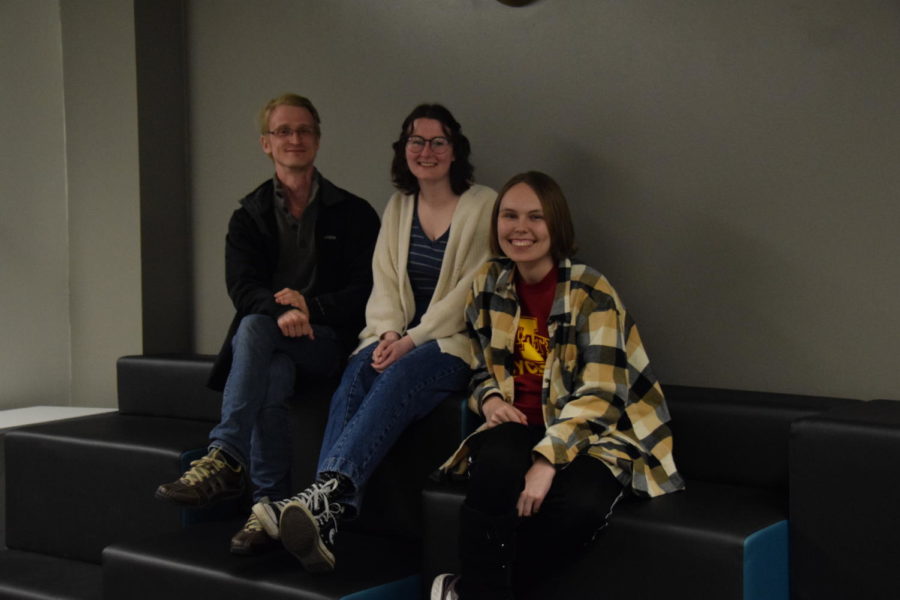New English Club notes the importance of professional communication
Michael Wettengel, Ethos Club adviser, Hannah Perry the Ethos Club president and Nicole Young pictured after the club meeting Monday night.
Iowa State’s ETHOS club held its inaugural meeting Monday night to promote the practical use of English and communication skills for all majors.
The ETHOS Club is “Iowa State University’s revamped English Club,” according to its page on the student organization database. The page states the club is for all majors interested in effectively utilizing English and communication skills.
A guest speaker from career services attended the club’s meeting and discussed the benefits of strong English and communication skills.
Michael Wettengel, a lecturer in the English department and the adviser for the club, said when he was an undergraduate, he wanted to know more about why to get an English degree and what he could do with the English skills he learned.
“It’s important that we find ways to reach as many people as possible and offer them practical skills,” Wettengel said.
Wettengel said he also wants to bring in speakers eventually to speak to the intellectual, spiritual side of creative writing and offer input on best writing practices.
Wettengel said English classes are a requirement for all majors to some extent, adding that students could benefit from maximizing their English experience by recognizing the practical uses as well as the finer points of the discipline.
The speaker for the new club’s first meeting was Tessa Brow, the assistant director for career services in the College of Liberal Arts and Sciences and an Iowa State graduate with majors in English and math. She said she uses English and communication skills constantly in her daily work.
“I think in addition to communication skills, English was also really big in exposing me to different viewpoints,” Brow said, “so I think there’s a lot of equity and inclusion work that comes within English.”
Brow said in her time taking English classes, she was exposed to different perspectives and learned to communicate across differences and empathize with people different from herself. Brow spoke on the role of English communication skills throughout her career and in the work she does to help prepare students for the professional world.
Brow said colleges teach a combination of technical and practical skills– technical being more tailored to specific career paths while practical skills can apply in many different settings. She said while the technical skills obtained through the degree are important for some professional roles, others rely more on the practical skills learned through various fields of study.
“So for some roles, major is really important, but I think for the vast majority it’s not so much what the title on your degree is, but did you develop these skills that we’re talking about?” Brow said. “Have you had exposure to those career fields through internships, shadowing or things like that?”
Brian Gillette, a lecturer in the English Department and entrepreneur, said the largest gap between what employers are looking for and the skillsets young professionals bring to the table is communication.
“A trend towards more technical skills and away from more liberal arts skills is something that’s happening all over the country,” Gillette said.
Gillette said the most important ingredient to succeeding and moving up in a job is professional and persuasive communication.
Brow said it is important that students understand the significance of developing their technical skills as well as a more diverse set of experiences.
Brow explained that for any complex topic or idea, it is important for people to have knowledge of the subject matter as well as the ability to communicate it effectively to those who are familiar with it and those who are not. She said knowing how to reach out to different audiences is key with any medium of communication.
Nicole Young, a senior majoring in English and treasurer for the ETHOS Club, was one of the club’s founders present at the inaugural event. She said she first became interested in the club partially because of the social aspect but also for fear of what she might do with her degree after graduation.
“Even seeing an adult English major who probably at one point felt just like us but now at least knows how to navigate the world outside of college– even that without the extra information is just really encouraging,” Young said.
Hannah Perry, a senior majoring in English and the president of ETHOS Club, said she got involved in the club based on Young’s suggestion. She said having transferred to Iowa State, she was left partially in the dark wondering where her degree might take her.
“It’s super reassuring to see real-life examples of this rather than just hearing so much uncertainty,” Perry said. “It’s really easy to fall into that mindset of ‘[English is] a useless degree,’ so I think being a part of the club has really combated that mindset, and I want to help other people.”
Wettengel said starting the club from scratch was a challenge, especially when setting up events and going through the planning procedures.
“Because our original adviser is retired, it was challenging to start from scratch and figure out that whole process kind of on our own,” Young said, “but now that we do at least have one meeting under our belt, we’re excited to continue doing that and have the process streamlined.”
Your donation will support the student journalists of the Iowa State Daily. Your contribution will allow us to purchase equipment, send our student journalists to conferences and off-set their cost of living so they can continue to do best-in-the-nation work at the Iowa State Daily.













